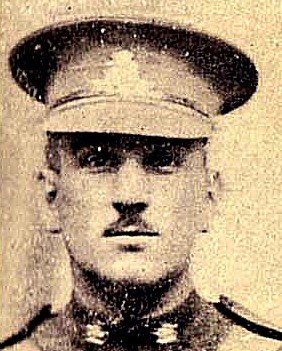Sgt
Edwin Assinder
Information about birth
|
Date of birth: 10/05/1887 |
|
Place of birth: London (City), Middlesex, England, United Kingdom |
General information
|
Profession: Timekeeper |
|
Religion: Church of England |
Army information
|
Country: Canada |
|
Force: Canadian Expeditionary Force |
|
Rank: Sergeant |
|
Service number: 300448 |
|
Enlistment date: 11/09/1915 |
|
Enlistment place: Barriefield, Ontario, Canada |
|
Units: — Canadian Artillery, 3rd T.M. Battery (Last known unit) |
Information about death
|
Date of death: 03/06/1916 |
|
Place of death: Yeomanry Post, Zillebeke, Belgium |
|
Cause of death: Killed in action (K.I.A.) |
|
Age: 29 |
Memorial
|
Ypres (Menin Gate) Memorial Panel: Panel 10. |
Points of interest 3
| #1 | Place of birth | ||
| #2 | Enlistment place | ||
| #3 | Place of death (approximate) |
My story
In late May 1916, the Canadian army occupied the heights east of Zillebeke. Their front line runs from the hamlet of Hooge across Hill 62 and Mount Sorrel to the foot of Hill 60. The positions between Mount Sorrel and Hill 62 were the only ones near Ypres where the Allies held higher ground than the Germans. It is precisely here that the latter planned a large-scale attack.
The German attacked on the morning of 2 June 1916, marking the beginning of the Battle of Mount Sorrel. After heavy shelling, the Germans detonated four mines at Mount Sorrel in the afternoon. Württemberg troops then overran the heights.
In haste, Canadian reinforcements were sent to the front. After an all-night march, a hastily assembled counterattack was launched. At the starting positions, confusion reigned. Hesitantly, the Canadian battalions launched the attack one by one, not knowing whether the men next to them would be able to follow. Meanwhile, it was full daylight. The fire was murderous. Only small groups managed to reach the German lines. The Canadians failed to recapture the heights, but were able to dig in at the foot of the ridge. During the counterattack, Edwin Assinder, a 29-year-old sergeant of the Canadian Artillery, 3rd Trench Mortar Battery, was killed.
On 3 June 1916, Edwin was in an underground shelter in Maple Copse, the forest a little further along this street. When the artillery fell silent for a moment, Edwin and a comrade left the relative safety of their shelter. As they crossed an open field, they came under fire. A grenade exploded in the ditch in which they were sheltering. Edwin was instantly dead and was buried on the spot. At the farm, called Yeomanry Post during the war, six other Canadians found their last resting place.
The German attacked on the morning of 2 June 1916, marking the beginning of the Battle of Mount Sorrel. After heavy shelling, the Germans detonated four mines at Mount Sorrel in the afternoon. Württemberg troops then overran the heights.
In haste, Canadian reinforcements were sent to the front. After an all-night march, a hastily assembled counterattack was launched. At the starting positions, confusion reigned. Hesitantly, the Canadian battalions launched the attack one by one, not knowing whether the men next to them would be able to follow. Meanwhile, it was full daylight. The fire was murderous. Only small groups managed to reach the German lines. The Canadians failed to recapture the heights, but were able to dig in at the foot of the ridge. During the counterattack, Edwin Assinder, a 29-year-old sergeant of the Canadian Artillery, 3rd Trench Mortar Battery, was killed.
On 3 June 1916, Edwin was in an underground shelter in Maple Copse, the forest a little further along this street. When the artillery fell silent for a moment, Edwin and a comrade left the relative safety of their shelter. As they crossed an open field, they came under fire. A grenade exploded in the ditch in which they were sheltering. Edwin was instantly dead and was buried on the spot. At the farm, called Yeomanry Post during the war, six other Canadians found their last resting place.
More information 2
|
Commonwealth War Graves Commission Database https://www.cwgc.org/find-records/find-war-dead/casualty-details/921872 |
|
Namenlijst (In Flanders Fields Museum) https://namenlijst.org/publicsearch/#/person/_id=580dca03-f307-4065-a8bb-d54cc086ef45 |
